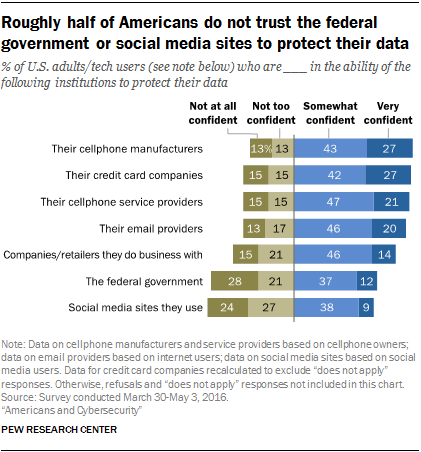 Are you busy? Do you have any of these: full-time job, children, elderly parents, friends, and maybe even a few interests or hobbies? How are you supposed to keep up with social media and data protection and privacy issues, too? Well, if you are involved in fundraising where giving is predicated on donor trust, your choice is to invest some time and resources now or suffer big losses later. Ask Facebook.
Are you busy? Do you have any of these: full-time job, children, elderly parents, friends, and maybe even a few interests or hobbies? How are you supposed to keep up with social media and data protection and privacy issues, too? Well, if you are involved in fundraising where giving is predicated on donor trust, your choice is to invest some time and resources now or suffer big losses later. Ask Facebook.
I’m going to give you a quick summary of the Facebook scandal, show you how easy it is to trip on information, and give you three things you can do now. Ready? Let’s go!
Quick Summary of Facebook Scandal
The recent Facebook scandal offers up a few salient lessons for fundraising.
In 2014 Cambridge University’s Psychometrics Center developed an app for Facebook users to take a personality survey. The app scraped some private information from their profiles and those of their friends (Facebook later banned this scraping activity). The Center refused to work with Cambridge Analytica, a political consultant firm, but Dr. Aleksandr Kogan, a psychology professor at Cambridge University, developed his own, similar app for Cambridge Analytica.
The users taking the personality survey were told it was being used for academic use, but it was not. The use of the name “Cambridge” aided in this deception. Dr. Kogan collected and passed along the information from the 270,000 survey takers, but also 87 million additional users. This information was then used to influence user behavior by showing them tailored stories and ads so to get them to vote for the designated political candidate.
The Fundraising and Data Issues
Have you heard about the General Data Protection Regulation (GDPR) going live in the European Union (EU) on May 25, 2018? Click here for guidance from the Institute of Fundraising. There’s talk of the US taking a cue from the Facebook-Cambridge Analytica debacle to draft something similar. One aspect of the regulation is that the person providing personal information should understand and consent to how that information is going to be used. A simple way to think about this is opt-in vs. opt-out.
When the Facebook users took the Cambridge Analytica survey they opted in, but to what information disclosure and use? Surely they did not understand explicitly what pieces of information were collected and that they would be used in an attempt to influence their behavior in a political election.
Do your donors know that you submit their data to a wealth screening or data modeling? Right now at this very moment could you fluidly explain to a donor what information is used in a wealth screening and why?
And even if you can leap that hurdle with the grace of a gazelle, there is the question of how a prospect not yet acquainted with you or your organization could be researched. How can you inform a donor prospect how you are going to use his/her personal information if you have not yet contacted the prospect? And then, what if you decide s/he is not a good prospect and don’t want to make any outreach? Do you still have to notify the person?
I pose these questions hoping you might begin to feel a little uncomfortable. And when you feel this way I’d like you to see how the US public feels about data protection as told through a Pew Research Center survey.
If Pew had asked the public if they felt that not-for-profit organizations protected their data, what do you speculate the answers would be? Skewed to the left with “not at all confident” or to the right with “very confident”?
Watch Your Step! It’s Information.
Trust is fickle. Based partly on emotions, trust is a decision and it is subject to change at any moment. You and I both know that the research we perform on our prospects and donors is done with the greatest care. But no matter how careful and ethical we are with information about our donors and prospects, ultimately their perception of our actions will determine whether they decide to continue to trust us.
All of us are subject to a firehose of data every day and our ability to trust any piece of data requires quick decisions. A simple example involves dates. If I want to know the answer to a question and I find an article online, a quick indicator of its value is its date. Is it very old information or newly published?
But look how easy it is to mislead with something as simple as a date:
Chart: What Assets Make Up Wealth? | Visual Capitalist | 2018
To look at the citation above you would believe it is very current. The article was written in 2018, but the data the article relied upon were compiled in 2016. Dates can be surprisingly complex. Ask Sabine Schuller, an expert in international prospect research. She wrote an entire blog post on the subject of dates!
3 Things You Can Do NOW
If you aren’t convinced yet that you and your organization should be re-evaluating data privacy policies, you should know that the UK Information Commissioner’s Office fined charities last year for data protection violations and those fines could reach millions under the new GDPR. The US is likely to enact legislation at some point. So what can you do now?
- Evaluate your data policies now. Start with some of the resources provided here and begin crafting a plan to assess and act. If you store and use data on EU citizens, that data will be subject to GDPR. And this goes beyond fundraising to all data held by your organization. Investing time and resources now will save you time and resources later. You need to continue earning the public and your donors’ trust in your organization.
- Get better – much better – at messaging around fundraising and prospect research. Do you understand prospect research? Do you still use words like “stalking” or “creepy”? Even in jest? If so, you have work to do to understand and better articulate the reasons for and benefits of fundraising research.
- Get serious about donor engagement. If you don’t already have some kind of advisory board or ad hoc committee, maybe it’s time to consider investing the resources to start one. Who better to be reviewing your policies and messaging? Or maybe you want to begin surveying or holding focus groups with your donors. Find a way to engage and listen to your donors.
Data privacy and protection issues may seem overwhelming, but if you start now and tackle it one step at a time you will be routinely strengthening and reinforcing your organization’s policies and procedures. And when new legislation or additional data scandals break, you will be ready and able to reassure the public and your donors.
Additional Resources
- The Morning after the night before and some thoughts about the future | Adrian Beney | 2017
- GDPR Clarity? In principle, yes! | Adrian Salmon | 2017
- Guide to Data Protection | UK Information Commissioners Office | Undated
- Get Ready for GDPR | Institute of Fundraising | Undated
- Facebook and Cambridge Analytica: What You Need to Know as Fallout Widens | The New York Times | 2018
- Dates and International Research: Surprisingly Complex | Sabine Schuller | 2018
- Americans’ complicated feelings about social media in an era of privacy concerns | Pew Research Center | 2018
